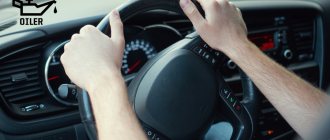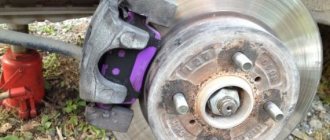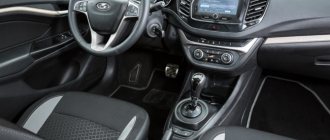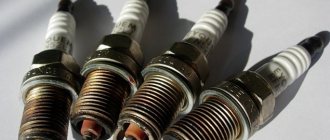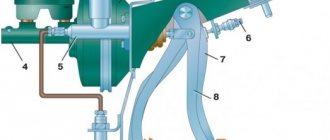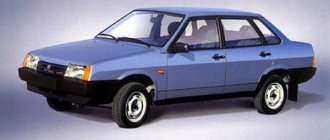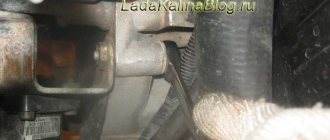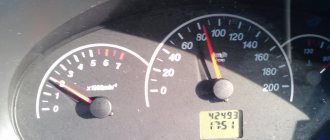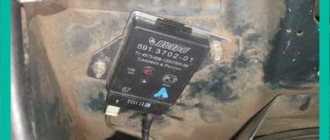1200 rub. for the photo report
We pay for photo reports on car repairs. Earnings from 10,000 rubles/month.
Write:
There are six main reasons why brake pads squeak . The simplest and most commonplace thing is their wear. However, in addition to this, the cause of squeaking can be brake discs, wheel bearings, incorrectly selected brake pads, dust, dirt, moisture or any small objects getting into the braking system.
As a rule, to eliminate the listed reasons, it is necessary to carry out an audit of the specified components and mechanisms. This can be done yourself, provided that you have experience in performing such repairs and have the appropriate tools. Naturally, eliminating the causes of squeaking brake pads yourself will save you money. However, remember that you must be confident in the final serviceability of the car’s braking system, because it is a critically important component and directly affects the safety of all road users.
Causes of squeaks
First of all, it is worth pointing out that in 90% of cases (and maybe more often) the front pads squeak. Therefore, the check must begin with them. This is explained very simply. During braking, the weight of the car is transferred forward, the bottom of the body lowers slightly, and the rear rises. Accordingly, the front pads experience greater load compared to the rear ones. And the sharper the braking process, the more intense the work of the front pads.
Caliper and guides
In this case we are talking about the boot of the main piston, as well as the guides. A situation often arises when it breaks due to mechanical damage or simply from old age, after which dirt, sand, moisture and any small debris gets inside it. Naturally, during driving and braking, this entire mixture rubs against metal surfaces, wearing them out.
The consequence of this may be a situation where the guides and the piston itself may simply jam . In turn, this will cause the pads to not return to their original position after braking. That is, they remain in a compressed position, heating up the brake disc and preventing the car from moving. Often this moment is accompanied by a creaking noise, which is caused by overheating of the disc, pads, and their wear. By the way, in this case, significant wear of the brake disc occurs; by its appearance (darkening from high temperature) one can indirectly determine the breakdown.
Brake pads
Even if the brake pads are not very worn, and perhaps even new, there are still a number of objective reasons why they may squeak/whistle after replacement. The first reason is the purchase of a low-quality non-original pad. Usually the original spare part is of high quality and such a block will not creak (with very rare exceptions). But manufacturers of non-original consumables usually save on their products.
In particular, cheap pads usually have a low-quality friction layer applied, which gradually wears out during braking. It can be of two types - soft and hard. The soft one wears out faster (after approximately 15 thousand kilometers), but is gentle on the disc and usually does not cause squeaks. But if the pad has a hard friction layer, then it wears out the brake disc much more and is often the cause of squeaking. But the advantage of such pads is their durability - up to 30 thousand kilometers or more.
Another reason for the presence of squeaks may be the absence of cuts and/or bevels on the surface of the block. The fact is that during the braking process, the surface of the pad is not completely (not ideal, depending on the type of pad and the installation process) adjacent to the disc, even if the system works correctly and the installation was done professionally. Therefore, during the braking process, when the surfaces of the pad and disc interact, a sound resonance occurs, which the human ear perceives as a squeak.
Some types of brake pads are equipped with so-called anti-squeak plates from the factory. As their name suggests, they serve to prevent pad squeaking and vibration during braking and also help dissipate heat. Accordingly, if they are absent, the block may produce sounds that are unpleasant to the ear.
Brake discs
During the braking process, due to friction, heat is generated on the surface of the brake disc, and the disc itself heats up. When the critical temperature reaches (this depends on the specific disc and the metal from which it is made), the disc may make unpleasant sounds, similar to squeaking and/or squeaking. Old, unventilated disks are especially susceptible to this phenomenon. They don't have holes to allow heat to escape, so they heat up faster and stay warm longer.
The principle of operation of the car's brake system
All modern brake systems work according to the same type. The work takes place in several stages:
- When you press the brake pedal, the pressure in the hydraulic brake system begins to gradually increase;
- The increased pressure in turn causes pressure in the brake pads;
- The pads, in turn, transfer energy to the wheel housing, which then brakes the car on the road.
Thus, pressure from the driver is transferred to the caliper, which is inextricably linked to the disc. As a result, the force applied to the brakes is directly proportional to the pressure of the disc on the wheels. That is why drivers can control the braking speed with a slight movement of their feet.
At the same time, manufacturers of brake pads and discs have made sure that your vehicle always operates quietly. Let us remind you: when the brake system is activated, the disc is pressed against the base of the wheel, causing vibration. To eliminate noise during contact and prevent strong vibration of the wheel, manufacturers divide the area of the brake pads into several specific segments, each of which has a special cut along the surface. This suppresses the occurrence of squeaking and vibration.
Often, when purchasing brake pads, buyers overlook the fact that there are no slots, which can cause not only squealing from the pads even on a new car model, but also a knocking sound in the front suspension on small bumps. However, you can make slots in the pads with your own hands. To do this, adhere to the following slot parameters:
- the width of the cut should be no more than 2 mm;
- incision depth – 3.5-4 mm.
Tip: if you want to completely dampen wheel vibration when braking, round the new brake pads. To carry out this operation, contact a car service center, where they will lightly file the edges on the pads and install new brakes to replace the old ones.
However, the cause of squeaking in the brake system is rarely due to a lack of slots. We propose to consider the most common problems with brakes and effective methods for eliminating them.
Brake pads and discs
Detection of material incompatibility after purchasing pads and discs
The problem here is related to the fact that each manufacturer keeps secret the composition from which the friction (or in other words, braking) part of the surface of the pads will be made. As a result, due to the mismatch of the material, a squealing noise occurs when the pads and disc come into contact. Since manufacturers are constantly looking for a way to create the most economical pads that will combine high braking performance and guarantee durability, factories cannot come to one patented composition.
The harder the final material is, from which the friction component of the brake pads will be made in the future, the more effective the braking will be. At the same time, hard compounds will cause strong vibrations in the wheel and a sharp squeak. With softer pad compounds, the likelihood of brake squealing is reduced to a minimum, but at the same time they wear out much faster.
If the material of the set of friction linings and brake discs installed on the car is incompatible, a squeaking sound appears. Moreover, it can be heard even when driving on a straight road without using the brake. To solve this problem, simply replace the brake pads with models made by another manufacturer.
Advice: if you have replaced the timing belt on a VAZ-2109 and at the same time replaced the old pads with new ones, and the “whistle” has not stopped, then do not immediately start sounding the alarm. Manufacturers coat the surface of the brake pads with a certain spray composition, which causes squeaking in the first 5-10 km of driving. It is enough to drive the car for several days, making a couple of sharp braking on a flat road, after which the coating will be completely erased.
Squeaking caused by the surface and design of the brakes
Note that to avoid squeaking in the pads, it is best to select samples of new brakes of exactly the same shape as the old ones. A complete match in shape with the original factory pads will create reliable fastening of the models in the caliper body, which in turn will prevent unnecessary vibrations.
The design of the pad also greatly influences its performance. All modern models have a division of the friction part of the brakes into 2-3 segments. As a result, the mass and final area of the braking segments become smaller, and the frequency of vibrations increases, which makes the whistle disappear. Therefore, before purchasing new samples, check the condition of the pad and disc segments, as well as the location of the cuts. If everything is in order, then the problem does not lie in their design.
Methods for eliminating squeaks
Methods for eliminating squeaking noise from brake pads depend on the reasons listed above.
Caliper and guides
First of all, it is necessary to check the condition of the boot and its integrity. If dirt has accumulated in it, then it is necessary to inspect it and replace it. At the same time, do not forget to check the free movement of the caliper and its piston. They should move freely and not interfere with the return of the brake pads to their original position.
To check, you can simply simulate braking with your hand by pressing on the piston, which will press the pads to the disc. After this, they should freely fall into place. If this does not happen, then it is necessary to inspect the caliper and its constituent elements. In this case, do not forget to use special lubricants for the calipers and guides. Very often, the problem with squeaking when braking is solved by simply rebuilding the caliper and lubricating the guides and outer sides of the pads.
Brake caliper repair kit. Set composition, application, manufacturers
Caliper repair kits are individual for each car. Often the kit includes sealing rings, guides, adjusting screws, adjustment devices, and lubricants. More details
Brake pads
Anti-squeak grooves on new pads
As for eliminating the first indicated reason, here it is only worth recommending for purchase more or less high-quality (not necessarily original) brake pads. That is, those that have a friction layer of average softness.
Sound resonance can be eliminated in different ways. The first of them also consists in recommending the purchase of those pads on the surface of which there are special cuts and bevels designed specifically for these purposes. Most of these products have them by default. You can also make such cuts yourself. However, please note that sawing off a large piece of the plate is dangerous, as this will reduce its efficiency! In addition, you need to know the place where to do this. Usually, to do this, a chamfer is removed along the perimeter of the block, and a narrow groove is made in the middle. For work you can use a grinder.
How to chamfer a block
Also, sound resonance can be eliminated using so-called anti-creaking plates. They are sold separately in stores and are subsequently installed on the brake pads. How to do this is indicated in their operating instructions. If you decide to buy anti-squeak plates, when installing them, do not forget to use the special lubricant that comes with them, which must be applied to the back side of the lining. Most manufacturers complete their pads with such metal plates, but you can also come across them without them.
Another function of anti-squeak pads is to remove heat from the brake disc . This will help extend its service life. It is worth noting that reviews of the use of anti-squeak plates from various car owners who have used them are very mixed. They can be summarized as follows: if the friction material of the pads is good, then the plates can help, but if the pad is initially of poor quality, then no anti-squeak plates will help.
Brake discs
Depending on the condition of the disks, you can take different routes to eliminate their squeaks. The simplest and most effective is to replace the old non-ventilated disk with a ventilated one. To do this, you need to know the brand and size of the product and select a spare part from the catalog or directly in the store. However, some older vehicles do not have non-ventilated discs.
Another option is to analyze the condition of the brake disc. If it is very worn, it can be sharpened or replaced with a new one. An indirect sign that the disc has “lost” is when the car brakes jerkily. Grooving the disc is possible only when it is slightly worn and its thickness is sufficient to remove a certain layer of metal using a machine. However, the best solution in this case would be to replace the disk with a new one. This will protect you from breakdowns and accidents on the roads in the future.
Why and when we encounter grinding
Sticking of the friction lining to the disc for a split second and its subsequent breakdown generates vibrations. The human ear perceives them as a whistle, hence the complaint that the brakes squeak when braking on a car, the class of which, by the way, can be absolutely any.
If we compare the degree of harm from squeaking and the consequences of a tight clutch, then the second is more dangerous to health. But squealing is hard to come to terms with morally. Every now and then it gives me a headache.
In 80% of cases, the symptom occurs after changing the pads. It happens that even the “originals” whistle. Those who have not looked beyond the rim for a long time or have entrusted this matter to inexperienced service workers are also faced with this fact. In humid weather, grinding noise is also possible.
Interesting Facts
Some new brake pads have what is called a primer . It is located above the main friction material. After installing such a new pad, when driving for the first 50.100 kilometers, a squeaking noise may occur due to the rubbing of the pads and wear of the initial layer. That's why new pads squeak after replacement. This should be taken calmly and taken for granted. However, in order to save nerves, before purchasing certain brake pads, it is necessary to clarify information about whether they have the mentioned initial layer.
Sometimes pad squeaking also occurs on drum brakes. A striking example of this is the popular Renault Logan car. He has a so-called childhood disease, which is expressed in the fact that during heavy braking, the pads (especially new ones) can cling to the support shield. The elimination of this drawback, which means that the pads do not cling and creak, consists of rubbing the friction point with sandpaper.
Also, occasionally, metal chips stick to the disc and drum brake pads. It causes a quiet squeak and a decrease in braking efficiency. To get rid of this phenomenon, you need to dismantle the pads and remove such deposits using fine sandpaper. Please note that you need to work carefully so as not to damage the pad and its working surface.
Conclusion
The search for the reasons why brake pads squeak should always begin with checking their condition. Most often, especially on cars with high mileage, their owners simply forget to replace them, and the pads create a squeak during braking due to wear. Remember that the pads must be changed in accordance with the requirements of the manufacturer of your car. They are often allowed to be used until they reach critical wear. On other cars, the pads need to be changed after a certain mileage (for example, 30 thousand kilometers).
If everything is in order with the pads, then you need to carefully check the above-mentioned components and elements of the car’s brake and chassis systems. Remember that repair work must be carried out responsibly so that the car’s brakes work flawlessly in the future!
The piercing and alarming squeak of car brakes has been familiar to each of us since childhood. We hear it in the movies, on the street outside the window, or in computer games related to automobiles. However, when your car's brakes squeal when braking, it's annoying, annoying, and forces you to do something to get rid of this unpleasant sound. We will look at the most common causes of squeaking car brakes, as well as ways to eliminate this squeak.
In general terms, the essence of the braking system of a regular passenger car is as follows. When it becomes necessary to stop the car, the brake pads block the brake disc on both sides, thereby stopping the rotation of the wheels. The pads are pressed against the disc by pistons, which are pressed by the brake fluid poured into the system. That's actually all the braking wisdom. Most often, an unpleasant squeak occurs from the contact of the pads and the disc, most often, but not always.
Let's sum it up
High-quality brake operation in a car is one of the most important features of a safe trip. If operating the machine causes certain difficulties or discomfort in terms of braking, you should immediately contact a service station and solve the problem. Otherwise, you may encounter unpleasant situations when braking turns out to be ineffective at a difficult moment and cannot provide the necessary operating features. Considering the importance of the braking system for safety, it is better not to joke with this unit and do all the work on time. Creaking and grinding noises can occur if you do not comply with the manufacturer's important car maintenance requirements.
Simply replacing your brake pads when squeaking begins can save you money, time, and keep you safe. To completely avoid trouble, it is enough to carry out the inspection on time and respond to all unpleasant manifestations. The behavior of the car, as well as the sound effects of problems, can also be an important point in diagnosing the car. Often these moments are an important harbinger of problems. What do you do if your car starts making any unnatural noises?
The brake system in a car is the most important control element, which means that any manifestations of malfunction, even insignificant at first glance, such as squeaking, squeaking, whistling and others, must be immediately diagnosed and eliminated.
Extraneous sounds during operation of the brake system indicate serious malfunctions and sooner or later can lead to system failure. What these sounds indicate and how to eliminate squeaking brakes will be described in detail below.
What to do if your brakes squeak
Perhaps the least obvious way to get rid of squeaking brake pads is to create cuts on the pad. This method is used both by reputable companies producing similar products and by garage craftsmen who have appreciated the effectiveness of this method. The essence of this method is that any creaking is vibration. Accordingly, dividing the vibrating array is an excellent way to change the vibration frequency. To do this, you need to make several cuts on the working surface of the block. But, if the manufacturer, dividing the block in this way, has an idea of how this will affect its performance and reliability, then you perform such an operation at your own peril and risk.
Sometimes lubrication of the guide calipers with a special product helps eliminate squeaking. And when replacing pads, all elements of the brake system that may need it should be lubricated.
Complete with brake pads, you can often find special anti-squeaking agents. These are plates that are installed between the brake pad and the piston. Such plates are designed to provide a tighter and more uniform fit between the pad and the brake disc. If the pads you bought do not come with such plates, you can purchase them separately.
Rounded edges on brake pads are another way to reduce vibration. This configuration allows the blocking force of the pad to be made more gradual, thereby reducing the level of vibration of the pads.
Tips and tricks for novice drivers
The above list of actions should save you from further squeaks, whistles and squeals from the brake system. However, if only a temporary solution to the problem appears, simply contact the nearest car service center, where they will offer you a full diagnosis of all components of the brake system and identify the malfunction.
- It is necessary to replace old pads with new ones after every 75-100 thousand km of the vehicle.
- Buy brake pads and rotors of the same brand and type as the original ones on the car.
- When driving on wet roads, squealing brakes are not uncommon, so dry the brakes a little first.
- To check the serviceability of the pads, perform about 5-10 gradual braking at low speeds.
- Any set of new spare parts, including the brake system, requires a certain amount of time to break in.
Source
Advertisements on NN.RU - Auto
Wide selection of hydraulic pumps and hydraulic motors of all series. Axial piston hydraulic motor. Splined shaft, reverse rotation. Analogs - (many. Price: 1,000 rub.
The company offers you to upgrade the Fiat Ducato Fiat Ducato basic version for a solution.
Lengthen Kamaz under a body 7.5 m Lengthen Maz Zubrenok, Maz under a body 9 m Re-equipment of the chassis of an extended truck.
A specialized company for the conversion of trucks produces extensions for man man, iveco and iveco truck tractors.
The eternal joke that truly useful things are not taught in schools is not such a joke: figuring out how to return taxes, for what.
The weather this weekend will not be very pleasant: summer warmth has not yet returned to our region. But neither are cold temperatures with heavy rains.
Today, Nizhny Novgorod fast food lovers have a real holiday: a new worldwide outlet has opened on the renovated Nizhne-Volzhskaya embankment.
Imagine, you wake up in the morning, open the curtains, bright sunlight bursts into your apartment, and outside the window is a stunningly beautiful landscape.
Some earlier, and some a little later, but almost all drivers are interested in the question of why there is a creaking sound in the rear wheel when driving. This will be especially interesting for drivers of relatively new cars, when they drive without unnecessary sounds, knocks, and suddenly an ear-piercing squeak appears in the areas of the rear wheels.
They act in such situations differently, some stop and start rushing around their car, while others act on the principle that a good squeak will come out.
Why there is a creaking sound in the rear wheel when driving, we will consider with you for different car models and situations that arise. Since such a problem can arise at any time, far from service points and technicians, it will be useful for all owners to know about the possible manifestations of such a problem. This will help you correctly navigate the situation and take appropriate measures.
